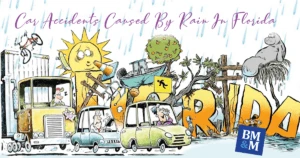
Florida is the third most dangerous state for driving. In 2021, there were over 400,000 vehicle accidents in the state. While not all of these events were caused by rain, many were. Rain has been shown to cause 10% of all automobile collisions.
According to the National Highway Traffic Safety Administration (NHTSA), wet pavement causes 70% of weather-related vehicle accidents, and rain accounts for 46% of those incidents. Every year in the United States, on average, more than 6,000 people lose their lives and 446,000 people are injured as a result of weather-related automobile accidents.
Rainy Weather Driving
Rainfall and wet road conditions significantly escalate driving hazards, particularly due to the risk of hydroplaning. Hydroplaning occurs when a vehicle’s tires lose traction on water-covered roads, often triggered by sudden movements or excessive acceleration. To mitigate this risk, it is crucial to adopt slower driving speeds during wet weather and execute lane changes gradually.
Additionally, reduced visibility during rainfall exacerbates driving challenges. Accumulated water on windshields coupled with decreased sight distances pose significant safety concerns. Activating headlights and windshield wipers upon rainfall onset, alongside maintaining vigilance of other drivers, is imperative for safe navigation.
Rain-Related Collisions and Motorcycle Safety
Motorcyclists face heightened dangers on wet roads, with even light rain presenting hazardous conditions. Due to their lack of protection compared to car occupants, motorcyclists are significantly more vulnerable to injuries in accidents. In fact, motorcycle riders are 28 times more likely to die in accidents than car drivers, a risk compounded by wet road conditions.
Motorcyclists encounter various challenges during rainy weather, including reduced traction, extended braking distances, hydroplaning, submerged road hazards, and diminished visibility.
Tips to Rain-Related Accidents
To ensure safety during stormy conditions, consider the following precautions:
- Maintain a cautious and deliberate driving pace, avoiding speeding, especially on wet roads.
- Steer clear of flooded areas, as minimal water depth can compromise vehicle control.
- Exercise patience and refrain from aggressive driving behaviors.
- Maintain a safe following distance to allow for adequate braking.
- Utilize headlights and wipers for improved visibility.
- Remain vigilant of motorcyclists, who are particularly vulnerable in wet weather conditions.
- If experiencing hydroplaning, gradually reduce speed by easing off the gas pedal rather than braking abruptly.
If you or a loved one has been involved in a rain-related car accident, Bogin, Munns & Munns is here to offer legal assistance. Contact us at 407-594-7974 or complete an online consultation form to explore your options for obtaining rightful compensation.
#FloridaDriving #RainAccidents #WeatherHazards #RoadSafety #Hydroplaning #CarAccidentLawyer #MotorcycleSafety #LegalAssistance #BoginMunnsMunns
Call or Submit Our Consultation Request Form Today





